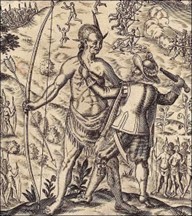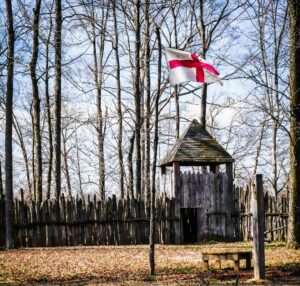The Third-Anglo Powhatan War was the last war between the English and the Powhatan in colonial Virginia. As the shortest of these three wars, it was also the least in question. The Second Anglo-Powhatan War (1622-1632) had left the Powhatan depleted and exhausted, while the English grew more powerful and numerous due to steady influxes of settlers hoping to make it rich on tobacco.
Article by Henricus Historical Park Staff
1644-46-Virginia: Third Anglo-Powhatan War
With rising numbers and a technological edge, the English occupied the militarily superior position and won the war relatively quickly—though only after being surprised once more by a devastating attack. This war, despite its brevity, still had wide-reaching effects in helping cement English domination over the old Powhatan homelands and by remaking remaining tribes into tributary nations under the power and responsibility of the king.
 In the aftermath of the peace of 1632 and in the lead up to 1644, the situation continued to worsen for the Powhatan. Facing land loss, starvation, and mistreatment, many smaller and weaker Powhatan tribes either dissolved or went to join up with others, reducing the size and power of the Chiefdom. Tobacco exacerbated this process. As the English expanded like never before into their lands, colonists’ tobacco wore out the soil and encouraged them to move deeper into Powhatan territory. At the same time, colonists demanded larger amounts of corn and food from the Indian population, who had less land with which to produce it. Some English also took advantage of the Powhatans’ exclusion from the legal process to take away additional land and to escape prosecution for certain crimes. These injustices and resentments engendered another response by Opechancanough, Chief Powhatan’s brother and now the sole leader of what remained of the Powhatan Chiefdom.
In the aftermath of the peace of 1632 and in the lead up to 1644, the situation continued to worsen for the Powhatan. Facing land loss, starvation, and mistreatment, many smaller and weaker Powhatan tribes either dissolved or went to join up with others, reducing the size and power of the Chiefdom. Tobacco exacerbated this process. As the English expanded like never before into their lands, colonists’ tobacco wore out the soil and encouraged them to move deeper into Powhatan territory. At the same time, colonists demanded larger amounts of corn and food from the Indian population, who had less land with which to produce it. Some English also took advantage of the Powhatans’ exclusion from the legal process to take away additional land and to escape prosecution for certain crimes. These injustices and resentments engendered another response by Opechancanough, Chief Powhatan’s brother and now the sole leader of what remained of the Powhatan Chiefdom.
In April 1644, more than twenty years after his first assault, Opechancanough and allied warriors surprised the English with deadly effect. Killing 400 settlers in  the surprise attack, the Powhatan managed to kill off about a twelfth of the colonial population and send the colonists into a brief panic once again. They failed, however, to follow up their success—just like in 1622—which allowed the English time to recover and strike back. The rest of 1644 and 1645 saw an English counter-offensive that assaulted numerous Powhatan towns and established forts along major rivers to solidify their gains (such as Fort Henry along the Appomattox—the future site of Petersburg). In 1646, English soldiers captured the aged Opechancanough, and a guard shot him dead just a few days later.
the surprise attack, the Powhatan managed to kill off about a twelfth of the colonial population and send the colonists into a brief panic once again. They failed, however, to follow up their success—just like in 1622—which allowed the English time to recover and strike back. The rest of 1644 and 1645 saw an English counter-offensive that assaulted numerous Powhatan towns and established forts along major rivers to solidify their gains (such as Fort Henry along the Appomattox—the future site of Petersburg). In 1646, English soldiers captured the aged Opechancanough, and a guard shot him dead just a few days later.
With its towns destroyed and its leader dead, the Powhatan Chiefdom’s power was truly broken, and the war ended soon after in October 1646. This treaty declared the Powhatan to be vassals under the authority of the English king and required all remaining tribes to pay annual tribute in skins. It furthermore prevented any Indian from leaving the land reserved for them upon pain of death. After forty years in Virginia and three wars, the colonists were firmly in control of colonial Virginia.
